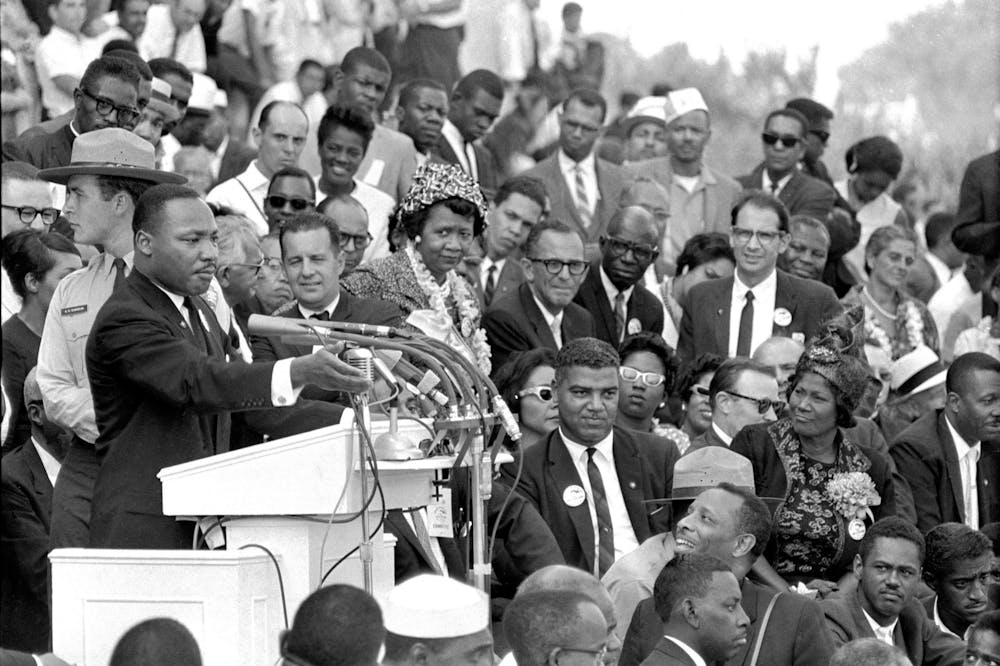Martin Luther King Jr. was one of the twentieth century’s biggest advocates for civil rights, social justice and equal protection under the law for all.
This Martin Luther King Jr. Day, don't forget King's fight for the working class.
When reflecting on King's legacy, most commentators praise his fight for equal rights and treatment of black Americans under the law. However, King was far more than an advocate for racial justice: He was also a key fighter against American imperialism and the deep-seated economic injustices experienced by the working class.
This major part of his legacy is mostly ignored almost every year in media coverage. Some political pundits go so far as to say King was a Republican. In fact, King had no party affiliation but self-described as much "more socialistic in his economic theory."
Judging by his vigorously anti-establishment and anti-imperialist policy positions, it is clear that he would be considered a democratic socialist today.
King was without question fighting for working people of all backgrounds, supporting worker unionization and policies such as a universal guaranteed income. He called the existence of poverty in America “as cruel and blind as the practice of cannibalism at the dawn of civilization.”
King was a big proponent of a living wage. In his view, any wage less than $2 an hour, or $15.95 an hour in today's dollars, according the Bureau of Labor Statistics, fails to give all Americans a decent standard of living. He described right-to-work laws as weapons against collective bargaining and worker mobilization with the aim of keeping wages low and job opportunities sparse.
King would surely be outraged with the current level of income inequality in America. The top 5% of Americans received nearly a quarter of all income in 2018, according to Census Bureau data.
The U.S. has increased its defense spending for five consecutive years, now totaling almost one trillion dollars, leaving substantially less money for social programs like those King wanted.
King repeatedly railed against the Vietnam War, calling the U.S. government “the greatest purveyor of violence in the world” in his 1967 "Beyond Vietnam" speech. According to King, U.S. involvement in the Vietnam War not only strengthened the military industrial complex but squashed the self-determination of the Vietnamese people, especially the poor. King also said it tore up the 1954 Geneva Accord, which guaranteed Vietnam's political autonomy.
U.S. interventionism has steadily increased since the war in Vietnam. What would King say regarding today’s bloated military?
Although King succeeded in his fight for racial justice following the passage of the Civil Rights Act of 1964 and the Voting Rights Act of 1965, parts of the American political establishment contributed to tarnishing his name and reputation.
According to historians, the FBI believed that King incited violence by "embracing black nationalism." However, King was the biggest advocate of nonviolent protest in the civil rights movement. Following King’s “Beyond Vietnam” speech, 168 major newspapers denounced him, according to a PBS documentary in 2010. The Washington Post editorial board, for example, wrote that he “diminished his usefulness to his cause, his country and his people.”
The FBI was authorized in 1963 to wiretap King for five years out of fear he might have had ties with the communist party in the Soviet Union. After finding no evidence, the FBI sent King a letter threatening to expose allegations of sexual philandering unless he stepped out of the political scene. The public knows little about what happened next, but historians have criticized the FBI's allegations.
Understanding King's legacy means recognizing where his work remains unfinished.
King's work has bridged race relations in America substantially, but it is also vital that his dream of full equality be carried out. Following his assassination, Jim Crow has taken many new forms including the war on drugs and the gutting of the Voting Rights Act in 2013.
Furthermore, the egregious privatization of health care and pharmaceuticals in this country leaves 45,000 people dead annually due a lack of basic care. Before he died, King said, “of all forms of inequality, injustice in healthcare is the most shocking and inhumane.”
When looking back at King’s life, these are the societal criticisms that should be talked about because they still ring true today. The U.S. does not have equality of opportunity, and we must drastically reform our country to achieve King's dream.






